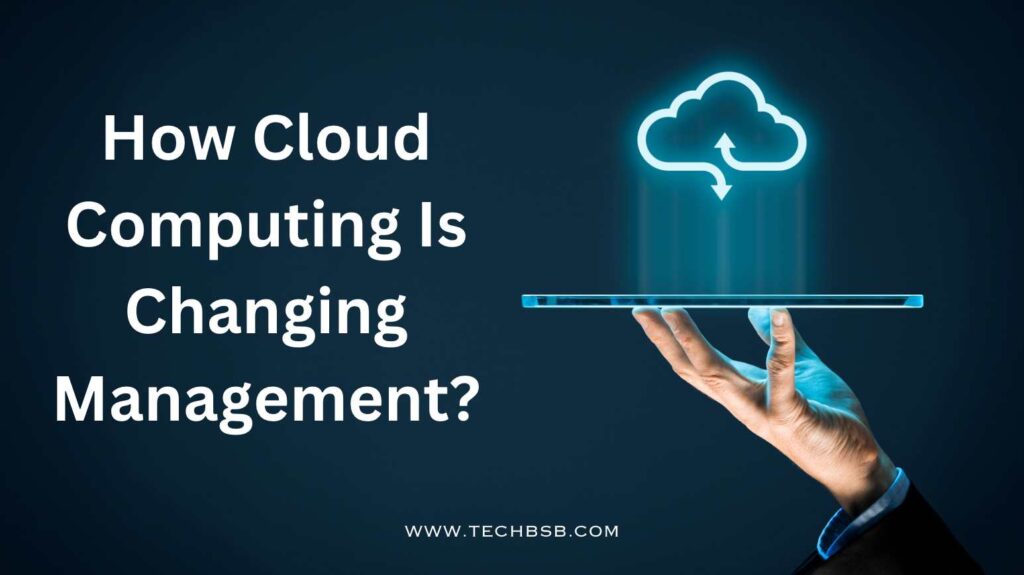Cloud computing is changing management by enabling greater flexibility, scalability, and accessibility of data and resources.
The use of cloud computing within different departments has become a crucial aspect of how businesses operate. But what exactly is cloud computing?
Well, think of it as a way to store and access data and programs over the internet instead of on your computer’s hard drive. It’s like having a virtual storage space that you can access from anywhere with an internet connection.

Why Is Management Important In Business Operations?
Management is like the backbone of any organization. It involves planning, organizing, leading, and controlling resources to achieve specific goals.
Without effective management, businesses can struggle to stay organized, meet deadlines, and adapt to changes in the market.
How Does Cloud Computing Impact Management Practices?
That’s what we’re here to explore. Cloud computing is changing the game for management in several ways. It’s revolutionizing how businesses handle tasks like remote workforce management, data-driven decision-making, and resource optimization.
With the rise of remote work, cloud computing allows managers to oversee their teams from anywhere in the world.

They can use collaboration tools and virtual team management platforms to keep everyone connected and productive, even if they’re not in the same physical location.
Cloud computing also empowers managers to make better decisions based on real-time data and insights. With access to advanced analytics tools, they can analyze market trends, customer behavior, and operational performance to make more informed strategic decisions.
Moreover, cloud computing offers cost efficiency and resource optimization. Instead of investing in expensive hardware and software upfront, businesses can pay for cloud services on a subscription basis, scaling up or down as needed.
This flexibility allows managers to allocate resources more efficiently and adapt quickly to changing business needs.
The Foundation of Cloud Computing
The foundation of cloud computing lies in the virtualization of resources, enabling on-demand access to computing power, storage, and services over the Internet.
Cloud computing is like having your own personal computer, but instead of being physically stored at your home or office, it’s all online. This means you can access your files and programs from anywhere with an internet connection.
Cloud computing has evolved a lot over time. It started with basic services like email and file storage, but now it includes everything from running software to storing vast amounts of data.
One big advantage of cloud computing is that you don’t need to worry about buying and maintaining expensive hardware like servers.
Instead, you pay for what you use, like electricity bills. This makes it much cheaper for businesses, especially small ones. Plus, since everything is stored online, you don’t need to worry about losing data if your computer breaks or gets stolen.
Transforming Management Practices

Cloud computing is changing the way businesses manage their operations in several significant ways. One of the key transformations is seen in how companies manage their remote workforce.
Remote Workforce Management
In the past, managing remote teams could be challenging due to limited communication tools and infrastructure. However, with cloud computing, businesses now have greater flexibility and scalability in managing their remote workforce.
Cloud-based collaboration tools such as video conferencing, document sharing, and project management platforms allow teams to work together seamlessly from different locations. This flexibility enables companies to hire talent from anywhere in the world and adapt quickly to changing business needs.
Data-driven Decision Making
Cloud computing has revolutionized decision-making processes by providing access to real-time analytics and insights. Previously, analyzing large volumes of data required expensive hardware and software investments.
Now, with cloud-based analytics platforms, businesses can quickly process and analyze data to make informed decisions. Real-time insights allow managers to monitor key performance indicators, identify trends, and respond promptly to market changes.
Cost Efficiency and Resource Optimization
Cloud computing offers a pay-as-you-go model, allowing businesses to pay only for the resources they use. This eliminates the need for large upfront investments in hardware and software infrastructure.
Companies can scale their resources up or down based on demand, reducing unnecessary costs. Furthermore, cloud providers offer resource pooling and allocation, optimizing the utilization of computing resources across multiple clients.
This shared infrastructure model leads to cost savings and improved efficiency for businesses of all sizes.
Enhanced Security and Risk Management
When we talk about data security in the cloud, we’re referring to how information is protected when it’s stored or transferred over the internet.
One way cloud computing enhances security is through encryption. Encryption scrambles data, making it unreadable to anyone who doesn’t have the key to unlock it.
This means that even if someone intercepts your data as it moves through the cloud, they won’t be able to make sense of it without the encryption key.
Access control is another important aspect of data security in the cloud. This means controlling who has permission to access certain information.

With cloud computing, businesses can set up strict access controls, ensuring that only authorized individuals can view or modify sensitive data. This helps prevent unauthorized access and reduces the risk of data breaches.
Compliance and regulatory requirements are also easier to manage with cloud computing. Many industries have strict rules about how data must be handled and stored to protect consumer privacy.
Cloud providers often offer services that help businesses meet these requirements, such as built-in compliance tools and regular security audits. This gives businesses peace of mind knowing they’re staying in line with regulations.
Disaster recovery and business continuity are critical for keeping operations running smoothly, especially in the face of unexpected events like natural disasters or cyber-attacks.
Cloud computing helps businesses prepare for these situations by offering redundancy and failover mechanisms. Redundancy means having multiple copies of data stored in different locations.
If one server fails, another one can take over, ensuring data remains accessible. Failover mechanisms automatically switch to backup systems if the primary system goes down, minimizing downtime.
Innovation and Agility
One key aspect where this transformation is evident is innovation and agility. Let’s break down how cloud computing is driving accelerated development and deployment, as well as enhancing scalability and elasticity.
Cloud computing enables what’s known as Infrastructure as Code (IaC) and DevOps practices. Instead of manually setting up and configuring hardware and software, IaC allows developers to define their infrastructure using code.
This means that infrastructure setups can be automated, making the process faster, more reliable, and less error-prone.
DevOps practices complement this by fostering collaboration between development and operations teams, leading to faster development cycles and more frequent deployments.
Continuous integration/continuous deployment (CI/CD) is another game-changer facilitated by cloud computing. CI involves automatically integrating code changes into a shared repository multiple times a day.
This allows developers to detect and fix issues early in the development process. CD takes this a step further by automating the deployment of code changes to production environments.
This means that new features and updates can be released to users rapidly and frequently, improving time-to-market and enabling companies to respond quickly to customer feedback.
One of the most significant advantages of cloud computing is its ability to scale resources automatically based on demand.
Traditional IT infrastructures often struggle to handle sudden spikes in user activity, leading to system slowdowns or crashes.
In contrast, cloud platforms can dynamically allocate additional resources as needed, ensuring optimal performance and user experience even during peak periods.
Challenges and Considerations of Cloud Computing in Management

As businesses adopt cloud computing to revolutionize their management practices, they encounter several challenges and considerations that need careful attention.
Here, we have explained about four crucial aspects that can significantly impact how effectively cloud computing changes management.
#1 Vendor Lock-in and Interoperability
One of the challenges of adopting cloud computing is the risk of becoming overly dependent on a single cloud service provider.
This dependency, known as vendor lock-in, can restrict a company’s ability to switch providers or integrate with other systems easily.
Additionally, ensuring interoperability between different cloud platforms and existing on-premises systems is essential for seamless operations.
Businesses must carefully evaluate vendor lock-in risks and prioritize solutions that offer flexibility and compatibility with their existing infrastructure.
#2 Data Privacy and Compliance Concerns
With the adoption of cloud computing comes the responsibility of safeguarding sensitive data and complying with various regulations and industry standards.
Data privacy concerns arise due to the shared nature of cloud infrastructure and the potential risks of unauthorized access or data breaches. Moreover, businesses operating in regulated industries must ensure that their cloud solutions comply with specific legal requirements, such as GDPR in Europe or HIPAA in the healthcare sector.
Addressing data privacy and compliance concerns requires robust security measures, thorough risk assessments, and transparent communication with cloud service providers.
#3 Skills Gap and Training Needs
Transitioning to cloud-based management requires a workforce equipped with the necessary skills and knowledge to leverage these technologies effectively. However, many organizations face a skills gap, with employees lacking expertise in cloud computing, data analytics, cybersecurity, and other relevant domains.
Bridging this gap necessitates investing in comprehensive training programs and upskilling initiatives to empower employees with the competencies needed to navigate the complexities of cloud-based management.
#4 Integration with Legacy Systems
Integrating cloud solutions with existing legacy systems poses significant technical challenges for many organizations. Legacy systems often rely on outdated technologies and may lack compatibility with modern cloud environments, leading to compatibility issues and data silos.
Achieving seamless integration requires careful planning, thorough assessment of existing systems, and implementation of appropriate middleware solutions or APIs.
Future Trends and Predictions
Innovative trends are shaping the future of management. Three major developments are on the horizon:
- Edge Computing and IoT Integration
- AI and Machine Learning-driven Management Solutions
- And Hybrid Cloud Adoption with Multi-cloud Strategies.
Edge Computing and IoT Integration is like bringing the brain closer to the action. Imagine if instead of sending all the information to a central computer far away, small, smart devices could process data right where they are.
This means faster response times and less strain on the network. For management, it means real-time decision-making becomes more feasible.
For example, in a factory, sensors on machines can detect when they need maintenance and automatically schedule repairs, optimizing productivity.
AI and Machine Learning-driven Management Solutions are like having a super-smart assistant. These technologies can analyze vast amounts of data to identify patterns and make predictions.

In management, this translates to better insights and smarter decision-making. For instance, AI algorithms can analyze customer behavior to suggest personalized marketing strategies or forecast sales trends accurately. This helps businesses stay ahead of the curve and adapt to changing market conditions more effectively.
Hybrid Cloud Adoption and Multi-cloud Strategies are about flexibility and resilience. Instead of relying on a single cloud provider, companies are embracing a mix of public and private clouds, as well as services from multiple vendors.
This allows them to choose the best solutions for different needs and avoid being locked into one provider. For management, this means more options for storing and accessing data securely. It also enables smoother collaboration between teams located in different regions or using different tools.
Looking ahead, these trends promise to revolutionize management practices further. Edge Computing and IoT Integration will bring intelligence to the edge of networks, enabling faster and more autonomous decision-making.
AI and Machine Learning-driven Management Solutions will empower managers with unprecedented insights and predictive capabilities.
Hybrid Cloud Adoption and Multi-cloud Strategies will offer greater flexibility and resilience, ensuring businesses can adapt to an ever-changing landscape.
Cloud Computing Is Changing the Management Industry for the Better
Cloud computing will continue to play an important role in shaping management practices. The future outlook suggests a growing emphasis on edge computing, IoT integration, and AI-driven management solutions.
Moreover, hybrid cloud adoption and multi-cloud strategies are expected to become more prevalent as businesses seek to optimize their IT infrastructures.
Adopting cloud computing and leveraging its transformative potential will be key to driving success in the management approaches of tomorrow.

